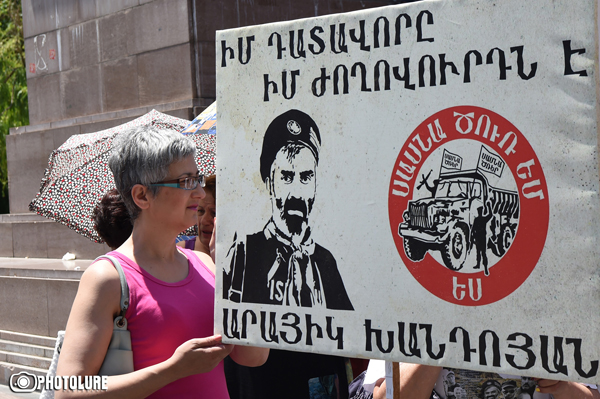Of course, I am not so naïve to believe that the police have used “proportionate force” against “Sasna Tsrer”. If a defendant or any other citizen gets into a conflict with a policeman, then the latter must be so self-possessed and professional that he can grab his hands without any extra movements, put handcuffs, and carry to the cell. But we know our policemen (rather, cops), “he cursed me…”.
In short, I believe that there has been a crime, for which the police must be brought before the court.
But if you are not either the government’s or “Sasna Tsrer” propagandist, if you are a journalist and write an analysis then the problem should be described as balanced and versatile as possible. Who does benefit from closed sessions of “Sasna Tsrer” and Sefilian? Of course, the government: they want quickly to sentence the armed rebellion supporters, and get rid of the problem. And what about the defendants and their supporters? They may have their interests in this only in case, if their main purpose is to say, “see what dictatorship it is, they hold closed sessions”. However, saying such thing once or for a few days is not a particularly serious purpose, compared to voicing political goals during an open trial.
If the defendants for the aforementioned two cases stand up when the court enters, and sit down during the trial, if they do not shout, curse, do not get into conflicts with the policemen and the bailiffs, then the authorities will have no basis for a deliberate closed-door trial. Earlier, during their trials, Hrant Margaryan, Vahan Hovhannisyan, Mushegh Saghatelyan, Manvel Yeghiazaryan, Sasun Mikayelyan, Alexander Arzumanyan, Nikol Pashinyan, Shant Harutyunyan and many other politicians did not hinder the trial when they were on defendant’s chair (let’s leave aside who was guilty for what). Did they believe in Armenian justice? Or did they believe that the court was independent? Obviously, they did not. They simply attached importance to publishing their truth, their message, not to making a mess at every session. If, of course, as I said, the ultimate goal is not the closed trial.
In the courtroom, Varuzhan Avetisyan from “Sasna Tsrer” called for an armed political struggle. Although I consider this form of struggle to be a deadlock in today’s Armenia, the statement, in my opinion, is welcomed, first, because it is sincere, secondly, defines the supporters and opponents of the armed political struggle. The main purpose of the defendants should be the justification for the need for armed struggle. But how is it possible to justify anything if you make noises and bring the sessions down?
Aram ABRAHAMYAN




















































